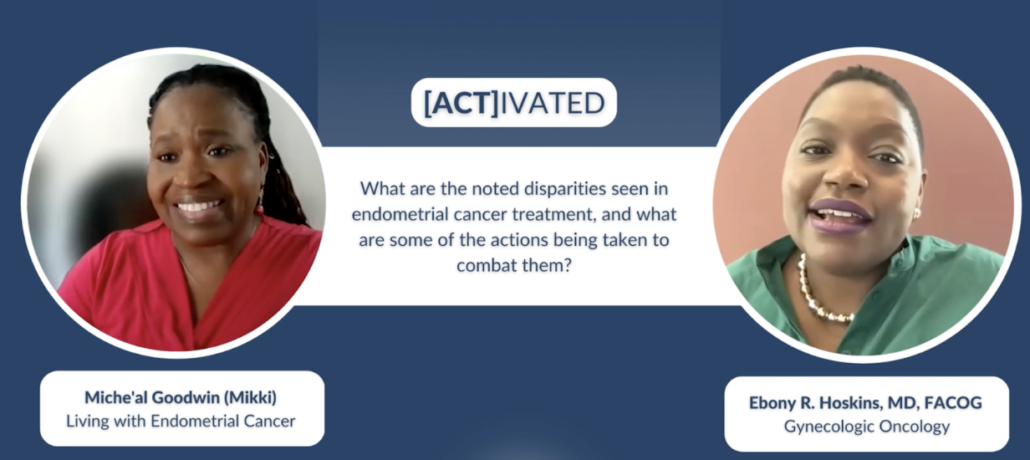What Are Treatment Options for Endometrial Cancer?
What endometrial cancer treatment options are currently available? Endometrial cancer expert Dr. Emily Ko shares an overview of options, including chemotherapy, surgery, radiation, targeted therapies, combination therapies, hormonal therapies, and discusses considerations for patients who are trying to preserve their fertility.
Related Programs:

|

|
Transcript:
Katherine:
I’d like to talk about the treatments that are currently available. You mentioned chemotherapy, but what else is available for people?
Dr. Ko:
Absolutely. So, treatment for endometrial cancer is usually some combination of surgery, and then it may be followed by possibly chemotherapy, as well as radiation, and sometimes, it may be a combination of all three treatments, or sometimes, it’s a combination of one or two of those, depending on the exact stage, depending on the exact cell type, and some of the other factors.
Katherine:
Are hormonal therapies used as well, and targeted therapies?
Dr. Ko:
Yes.
Katherine:
I know they are in other cancers.
Dr. Ko:
Yes. And so, I think the question is where do those come into play? So, I would say the usual algorithm most commonly would be that surgery is done first, as the most common first step, and then, based on the information obtained from surgery and the pathology report that comes from that, then there’s usually some type of a recommendation about should there be a second stepped treatment, and that frequently can be chemotherapy/radiation.
Now, the areas where targeted therapy – for example, immunotherapy – where does that come in? So, that now has come into the – I would call it the second stage. We’re combining it with the classic chemotherapy drugs – Taxol-carboplatin, for example. That’s one example where it could come into play. Another example could come into play where a patient had gone through classic Taxol/paclitaxel and carboplatin, then had cancer come back, and so, that could be another instance where that pembrolizumab or pembro with lenvatinib (Lenvima) combination can be used in the setting of recurrence.
Now, we could also say, hey, if your cancer type has those hormonal receptors present or is some type of what we call endometrioid histology, and we think that hormonal therapy may be more effective in that case, then that could also be used in a setting where the cancer has kind of grown again, the cancer has grown back, or actually, there are certain situations where patients, for example, may not undergo a hysterectomy.
And, there are unique cases and those situations where patients are still trying to preserve their fertility, and therefore not wanting to undergo a hysterectomy, or they’re unable to undergo surgery safely. And so, in some unique situations, we may also use hormonal therapy as the mechanism to treat their cancer, and whether that is by way of a pill, whether that is by way of a progesterone intrauterine device, IUD, that is placed into the uterus, we also have situations where we tailor the therapy to the condition of the patient.
Katherine:
When treating more advanced endometrial cancer disease in general, are the treatment options different than if you were treating somebody who had stage I or stage II, for instance?
Dr. Ko:
Sure, great question. So, for some patients with, say, stage I, surgery alone is enough.
For some other patients, subcategories of stage I, where we call them more high/intermediate-risk patients, they’re stage I, but there are a few features about their pathology that might make them slightly higher risk for recurrence – in those cases, we might consider a little bit of radiation after surgery, what we call adjuvant radiation or what we call radiation vaginal brachytherapy. Just three short treatments of a little bit of radiation to the top of the vagina has been shown to possibly decrease chance of recurrence in that area with very minimal side effects.
So, that would be more commonly in line with stage I. There are some subtypes that can still be what we call high-risk, even in stage I/stage II uterine serous carcinoma, uterine carcinosarcoma. In those cases, we might also recommend chemotherapy along with some vaginal brachytherapy following their hysterectomy, so that’s the early stage.
And then, with the advanced stage, yes. So, frequently, it’d be surgery first to secure the diagnosis, followed by some type of – it might be primarily chemotherapy, or it could be combination chemotherapy with radiation. And over time, I would say our paradigm for what we use for chemotherapy and radiation has changed a little bit.
If you go back a couple decades, I think radiation was used a lot – whole pelvic radiation, even just without any chemotherapy. And then, we then had more data from research clinical trials, GOG-258 or PORTEC-3, that then had given us evidence that perhaps doing chemotherapy with some combination of radiation is going to be beneficial, or even moving towards primarily radiation could be a very good option in terms of long-term benefit/long-term survival.
And, of course, that brings us to the present day, those two trials that I mentioned from ASCO, the GY018 and the RUBY, now bringing in the immunotherapy component to the chemotherapy, so there has definitely been an evolution to managing advanced stage.






